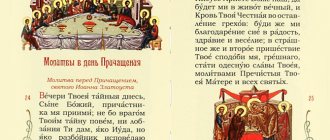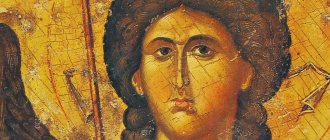Keeping the commandments
The main gratitude is the observance of the Ten Commandments that Moses received from God on Mount Sinai. Don’t kill, don’t steal, don’t envy, don’t commit adultery, honor your parents... It would seem that these are the rules of life for an ordinary decent person. However, it is incredibly difficult to comply with everything.
Our heroine Anna considered herself a pious woman. She went to church, fasted, and prayed daily. However, when she accidentally made a mistake at work, she had to choose: either admit her mistake and lose her bonus, or shift the blame to a co-worker.
The woman chose the second option, thereby violating the ninth commandment, which states: “You shall not bear false witness against your neighbor.” Anna managed to receive the prize, but after this incident she began to be tormented by remorse. The woman felt that the Lord was displeased with her. And then she did the right thing: she admitted her mistake to the director and apologized to her colleague.
Yes, Anna received a reprimand, but her soul was calm. After that, every evening in prayer she thanked God for giving these commandments to humanity. She also thanked the Almighty for allowing her to sin, suffer and atone for her sin.
You need to know this
Thank God more often for everything that happens in life. Remembering that the ways of the Lord are mysterious. We think it should be this way, but God knows what is best for you and me.
Go to church, offer your prayers in the house of God. Confess, partake of the Holy Mysteries of Christ. And be sure to wear a cross. The cross is “a bell around the neck of God’s lamb.”
Sincere Prayer
Thus, there is one way to thank God - to pray correctly. This can be done both in the church and outside it; out loud and mentally; the main thing is that these words come from the very depths of the soul.
But it should be remembered that a prayer of gratitude is not one that is a response only to joyful events. Gratitude must be expressed even in difficult periods of life, because the Lord sends trials to a person so that in the end he finds good.
This is what Arkady did, who had an accident and suffered a spinal cord injury. He not only asked all the saints and his guardian angel to restore his health, but also thanked God every day in prayer for saving his life. Gradually, following the doctors’ orders, believing in the best and saying “thank you” to the Lord for every day he lived, Arkady began to recover.
Two years later, he got back on his feet and does not consider it a miracle: the man knows that this was a test from the Almighty, and he did the right thing, maintaining faith in the best.
What is a thanksgiving prayer
The very concept of a thanksgiving service originated during the life of Jesus Christ and is associated with his miraculous deeds. According to the Gospel, during his travels our Lord, Jesus Christ, met 10 people with leprosy. They became outcasts among their compatriots, and no one wanted to lend them a helping hand.
Then Jesus gathered them together, after which he delivered the suffering from their bodily illness. The lucky ones went to their families, and only one returned to the savior with speeches of gratitude.
Such ingratitude of the healed saddened God, and later a ritual was invented that serves as a reminder of the need to remember good deeds.
Today there are a large number of thanksgiving prayers that can be dedicated to:
- Mother of God;
- Saints;
- Jesus Christ.
Candles
The next way to express gratitude to God for the help provided is to light a candle in the church. For this, select the icon of the Savior, which is usually located on the right side of the altar. Read the prayer, say “thank you” for giving his life to save humanity. And luck will turn its face to you!
This happened to Anastasia, who really wanted a child, but for health reasons could not get pregnant. The girl attended church; I lit candles for both the Savior and the Mother of God; thanked her for all the good things in her life. And heaven helped her: Anastasia carried and gave birth to a wonderful son. After that, she began to thank God and her guardian angel with redoubled force. And most importantly, when the child grew up, she told him about the just and loving Lord, whose mercy is endless.
Appeal to an angel
However, you can thank not only the Creator, but also your guardian angel. After all, he is invisibly next to each of us, protecting, protecting and guiding. This can be done at any time, either with a special prayer or with ordinary words. For example: “Thank you, guardian angel, for following me and leading me, invisibly helping me and covering me with your wing.”
Again, words of gratitude can be anything; the main thing is that they are spoken from the heart and supported by pious actions. For a guardian angel, your destiny is of utmost importance. Therefore, do not forget to let him into your life. To do this, you should remember the day of honoring the angel: November 21 (the day of remembrance of all angels). On this day, it is important to come to church and light a candle with words of gratitude to your protector.
How to order correctly
When ordering a thanksgiving prayer, you need to know the rules of behavior and the correct sequence of actions. Usually this does not pose a problem for experienced believers who have attended such events more than once.
Algorithm of actions:
- fill out a note with petitions to the Lord;
- we go to the nearest temple with a completed note, handing it over to the priest in accordance with the established rules;
- We purchase the candles necessary for the ceremony.
How to write a note
A note for a prayer of thanks must be written as follows:
- take a sheet of A4 format;
- at the top we draw the sign of the cross;
- under the cross we write the phrase “Thanksgiving prayer”;
- We make a list of names that must be announced to the priest during the prayer. Keep in mind that the number of names should not be more than 10, and they are all declined in the genitive case;
- Men's names come first, women's names are listed next, and children are listed at the very end.
It is not allowed to indicate the names of those people who did not undergo baptism or committed suicide.
Submission rules
An application can be submitted with the help of any family member. Some nuances should be taken into account:
- You can't bring a note to church every day. The prayer service is not held on the preparatory days before the celebration of Lent;
- it is advisable to bring a note the day before the prayer service;
- You can give a note to the candle seller, available in every temple. A small donation is also made to the temple for good needs. The amount is not fixed, everyone gives as much as they feel comfortable with;
- It is not necessary to fill out the note at home. Temples have a ready-made sample note in which you only need to enter names.
Candles
For the service you need to buy several candles blessed in the temple. The exact number of candles sufficient for a prayer of thanksgiving can be checked with the servant who sells them.
Appreciation of the Saints
Very often, Orthodox people themselves choose one of the famous saints as their patron. Feeling his support and help in all endeavors, a person experiences a feeling of grace. To express gratitude to the saint, you can do the following:
- light a candle for the icon;
- read the akathist;
- donate to the temple;
- give alms to a beggar;
- turn with words of gratitude in prayer.
And, of course, do good deeds. They are the ones who will delight the saints who patronize you. Noble deeds will prove that the help they provided was not in vain.
As confirmation - an example from life. Alcoholism is a terrible disease, and Elena knew about it firsthand. Her husband Vadim is a heavy drinker: neither admonitions, nor scandals, nor coding helped him. Then Elena began to regularly attend church and ask Matronushka of Moscow to help her husband. A miracle happened: the man came to his senses and stopped drinking. Elena thanked Matronushka for a long time and promised to help everyone in need. She kept her word; and Vadim, indeed, never touched the bottle again.
We have something to thank God for every minute!
Abbess Domnika (Korobeinikova)
About happiness, which does not need to be sought far, about deceptive thoughts and about gratitude, which returns the meaning of life - in a new conversation with Abbess Domniki, abbess of the Alexander Nevsky Novo-Tikhvin Convent in Yekaterinburg.
At the beginning of the conversation, I would like to read you an excerpt from a letter from St. Nicholas of Serbia.
One of his spiritual daughters asked him: “Why doesn’t the Gospel talk about happiness?” And this is what Saint Nicholas answered:
“How come, darling, it doesn’t say? What does the Gospel talk about more than the happiness of people? It seems to me that the Gospel can be called the Book of Happiness, and the science of Christ can be called the science of happiness. Are you confused that the word “happiness” is not written in the Gospel? But instead of this word there are other words, for example, “joy”, “fun”, “paradise”, “bliss”. The word “bliss” means the highest happiness. Do you know what science the Lord taught people first? The science of happiness. The Orthodox Church always repeats this science to people at the beginning of the liturgy by singing “Blessed.”
This is the answer St. Nicholas gave to his spiritual daughter. And could it really be that the Gospel did not talk about happiness? How could the Gospel not give an answer to the most important question that occupies a person: what is happiness and how to find it? The Lord, having come to earth, to people, began His sermon precisely with an answer to this question. And with His answer He made happiness very close to each person, one might say, he put it into his hands.
Usually a person imagines happiness as something distant, something that will come when circumstances change. One, for example, thinks: “If I have another job, then I will be happy.” Another thinks: “If I have other neighbors, then I will be fine.” The third believes that he needs some kind of trip to be happy. It also happens that a person, for example, dreams of changing the shape of his nose and thinks that then his whole life will change. And people actually do just that. But often a person, having achieved what he wants, sees that there is no happiness in this. And then a person experiences shock, so that sometimes he even completely loses the meaning of life. This always happens when a person chases any dream or idea. By this, one might say, he ensures his own misfortune. Elder Emilian
explains why this happens:
“When we are occupied with something, when we desire something earthly and persistently strive for it, we become unhappy because we think about our desire, about the creation of our heart, and not about God.”
A person becomes unhappy when he begins to chase what his heart generates, that is, his imagination, his passions. And this is the most tragic mistake of man. In pursuit of the creations of his fantasy, he misses true bliss.
And the Lord, knowing this painful problem of all people, immediately gave them a solution. He said: “Don’t look for happiness somewhere far away. There is no need to run after him, rush, or achieve him. Bliss is near, it is within you.” And then He told them what true happiness was, that is, He gave them the Beatitudes. When a person fulfills them, then he becomes happy.
Someone may say: “But how can you fulfill all these commandments? They are so difficult and high! In fact, there is a way to do them all at once. And this method is available to anyone. Here is how the Monk Paisius the Svyatogorets speaks about this: “Let everything that happens to us be for us not a topic for thoughts, but a reason for gratitude.”
Gratitude is the way by which a person fulfills all the beatitudes and becomes happy.
Everything that surrounds us, everything that happens to us, can become a topic for us to think: “Why does he/she behave this way? Why do I have this job? It snowed again, it rained again, everything was wrong again...” And then, of course, we don’t feel any happiness and bliss. But as soon as we begin to give thanks, for example, to say: “Lord Jesus Christ, Son of God, glory to You!”, of course, not only with our lips, but with all our hearts - and we soon feel that we are blessed. After all, when we give thanks, we express deep humility, meekness, and our desire for purity of heart, that is, everything that is described in the Beatitudes.
At St. Nicholas of Serbia
there is such an interesting parable. He talks about a certain nobleman who lived in a palace, in great luxury and bliss, he had everything, but at the same time he was tormented by a severe melancholy. And then one day he decided to go on a trip to unwind. He rode for a long time on his horse, but did not meet anything interesting on the way. Until, finally, he arrived at a field where there was a plowman with two oxen. And here the rich man saw an unusual picture. Next I will read:
“The nobleman sees: one ox is lying on the ground, the other is standing in a yoke, and the plowman is in the furrow on his knees with raised hands, constantly exclaiming: “Glory to Thee, God!” Thank you!". In complete bewilderment, the nobleman got off his horse, approached the plowman and asked:
-Why do you thank God so much, buddy? “One of my ox has fallen,” answered the plowman. - And you thank God for this? – the rich man was surprised. - Yes, for that. - I don’t understand anything! - said the nobleman. “Another person in your place would sob, groan and complain about the injustice of heaven and earth, but you thank God!” Explain: for what? The plowman sighed and said: “I am a sinful person, that’s why this misfortune befell me.” Instead of punishing me with death for my sins, the Lord took one ox from me. How can I not thank Him? The nobleman was even more surprised and asked again: “Okay, but how are you going to plow on your own now?” - The Lord will control! - the plowman answered, and his face lit up with a slight smile. The nobleman thought that he, who lived in the palace, had not smiled as brightly as this poor peasant for years. Then the rich man took out several gold coins from his pocket. “Here, take this,” he said to the peasant, “buy yourself another ox.” Today I learned a lot from you. The peasant joyfully exclaimed: “Didn’t I tell you, sir, that the Lord will manage everything?” And he again raised his hands to the sky and repeated loudly: “Thank you, God!” Thank You, God!”
The parable could have ended there. But it has a sequel. Saint Nicholas says that after this meeting the nobleman set off on his way back, and when he approached his palace, he saw that it was engulfed in flames. What did the nobleman do? He fell to his knees, raised his hands and exclaimed: “Thank You, God! Thank You, God!”
And to the servants, amazed by his action, he said: “Calm down! I haven’t thanked God for so many years, although He gave me everything. I will begin to give thanks now that He takes it from me. Now the time has come for me to work, and this is what I need to regain the meaning of life.” And the nobleman diligently devoted himself to work, starting to build a new house. And, as St. Nicholas writes, “his spirit perked up, his soul became clearer, his heart cheered. And the rich man got used to thanking God for everything every day.”
This is how Saint Nicholas ends his parable. It sounds like a fairy tale, but it describes real things. Indeed, not a single person who thanked God was deceived. Gratitude opens a person's eyes so that he begins to see how God works in different circumstances of his life, how He continually pours out His love on him. And it is natural for a person to always be grateful to the Lord, for every person at any moment of his life has something to thank God for.
On the contrary, those who do not thank are constantly deceived. Such a person is deceived by his own thoughts. Everything may be perfect for him; God has given him everything. But he has some small feature that he considers a disadvantage. And now a man has been thinking about this shortcoming for 30 years and considers himself unhappy. For example, someone thinks that he was unlucky with his parents: “If I had been born in another family, I would have been happy.” Some people think that his red hair is to blame for all his difficulties, because as a child everyone teased him for it. Another complains that he did not go to the best school or did not receive a higher education. And these thoughts so obscure a person’s eyes that he does not see the gifts of God with which his life is full. And a very strange thing turns out: a person is richly gifted from God, everyone admires him, but the slightest thought makes him unhappy! Venerable Paisiy Svyatogorets
spoke about this:
“Why do we, instead of rejoicing and thanking God for all good things, do stupid things and are tempted by the slightest: why did he tell me that, why did he look at me wrong, why did he take the glass and go there, and not here... and thousands of other children's things."
Thus, thoughts can deceive a person, as if blinding him and making his life gloomy. And to prevent this, it is important to always watch your heart. As soon as we notice that something upsets us, the thought approaches our heart: “I’m unhappy because this and that happened to me, or I don’t have this and that...”, we will know that the biggest mistake is to believe this thought. Such thoughts can arise in some unexpected everyday situations, or simply because we are accustomed to carrying a long-standing resentment or grief within ourselves. Let us work and stay awake so as not to let these thoughts in, not to talk with them, but to always keep in our hearts a feeling of gratitude to God. Let us once again recall the wise words of St. Paisius the Holy Mountain: “Let everything that happens to us be for us not a topic for thoughts, but a reason for gratitude.”
These short words contain the whole secret of happiness. Bliss does not lie in having something external to change circumstances, but in giving thanks for everything and through this being at peace with God and feeling His love. As the Monk Silouan of Athos says: “I used to think that this is happiness on earth: I am healthy, handsome, rich, and people love me. And I was proud of it. But when I came to know the Lord by the Holy Spirit, then I began to look at all the happiness in the world as if it were smoke that is carried away by the wind. And the grace of the Holy Spirit gladdens and gladdens the soul, and it contemplates the Lord in deep peace.”
August 20, 2022 Source: Alexander Nevsky Novo-Tikhvin Convent
Social media
Short link:
copied
Letter to the Universe
Not every person is religious. However, many believe, if not in God or a guardian angel, then at least in an infinite and wise Universe. It is to her that they address words of gratitude, it is to her that they ask for mercy for themselves. But how to do it right? There are several techniques.
The most common of them is “Letter to the Universe.” It's very simple: you need to take a piece of paper and a pen and write about your gratitude to the Cosmos. The text can be in any form, the main thing is from the heart. If you thank the Universe for your birth, successes and even failures, the result will not be long in coming.
A striking example of this is Tatyana. She “sent” letters of gratitude to the Universe every month. It looked like this: in her messages, Tatyana indicated all the achievements and positive situations that happened during this period. Here she thanked the Universe for all the joys, went into nature, where she burned the letter and scattered its ashes in the wind. And, surprisingly, Tatiana was lucky everywhere, and her positive attitude towards life simply attracted good people to her.
Skeptics will say that this is a coincidence. However, nothing in the world is accidental. After all, scientists have proven that if you sincerely thank God, your guardian angel, the saints, the Universe or the people around you, this will become a powerful impetus for internal transformation. And, as we know, it leads to external transformations.
Salvation is in gratitude
The famous American entrepreneur and author of books on self-help issues, Joe Vitale, described the following case in one of his works. A man named Jonathan became seriously ill. Bilateral pneumonia was very severe, and there was no end in sight to his suffering. Then Jonathan did the right thing: he hung numerous pieces of paper on all the walls, on which one sentence was written.
It read: “Thank you, Lord, for all the blessings that I have and for all the blessings that I will receive.”
. Incredible, but true: exactly 24 hours later the disease subsided and the man recovered! The power of gratitude is incredible, and it's worth remembering even in the darkest of times.
*when copying material, a link to the source is required
Reading at home
At home, you can read not only thanksgiving akathists and prayers. Morning and evening prayers, the Gospel - at least a chapter a day, the Psalter - daily according to kathisma, this is the basic minimum rule of an Orthodox Christian.
If you have time and opportunity, you can read an akathist to the saint, to whom they most often resort for help. For some it is Nicholas the Wonderworker, for others it is Sergius of Radonezh. Both Matrona of Moscow and Ksenia of St. Petersburg help us, and every saint will help if a person sincerely asks him for something. After the request has been fulfilled, do not forget to thank the Lord God and the saint to whom you addressed.










